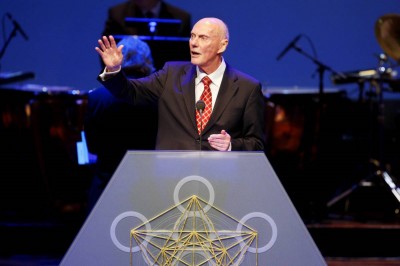Fred Kavli emigrated from Norway as a young man, made a fortune as an engineer and entrepreneur in California, and now is sharing his wealth and inspiration with others in the form of generous prizes for scientists. The Kavli Prizes were awarded in Oslo Tuesday, amidst royalty and some showbiz glitter.

Kavli decided to award his prizes “back home” in Norway, through a partnership with the Norwegian Academy of Science and Letters (Det Norske Videnskaps-Akademi), The Kavli Foundation and the Norwegian Ministry of Education and Research.
Kavli wanted to recognize outstanding scientific research, honour highly creative scientists, boost cooperation among them internationally and, not least, use the prizes to promote public understanding of scientists and their work. With the King of Norway, Harald V, formally handing over the prizes this year, and celebrities like actor Alan Alda and author Bill Bryson taking part in activities around the prizes, they’ve attracted quite a bit of attention, at least in the Norwegian media.
The Kavli Prizes (external link) are awarded in three categories — astrophysics, nanoscience and neuroscience — with winners sharing a total of USD 1 million in each category.

This year’s winners in the astrophysics category are Jerry Nelson of the University of California at Santa Cruz, Ray Wilson of the Imperial College in London and the European Southern Observatory and Roger Angel of the University of Arizona at Tucson for their work in telescope design. Their work contributing to the development of giant telescopes “have allowed us glimpses of ever more distant and ancient objects and events in remote corners of the universe,” according to the Kavli committee.

The nanoscience laureates are Donald Eigler of the IBM Almaden Research Center in San Jose, California and Nadrian Seeman of New York University, for their new methods of handling nano particles used in nano technology which in turn is used in medicine, environmental protection and solar energy. The Kavli Prize committee honoured them “for their development of unprecedented methods to control matter on the nanoscale.”

Winners of the Kavli Prize in neuroscience are Thomas Südhof of the Stanford University School of Medicine in California, Richard Scheller of the biotech company Genentech in California and James Rothman of Yale University. The three were lauded for their work “to reveal the precise molecular basis of the transfer of signals between nerve cells in the brain.”
All the winners were chosen by committees of leading international scientists in all three fields. Norway is known as the home of several major international prizes, from the Nobel Peace Prize to the Abel and Rafto prizes, and the Norwegian government seems proud to be working with Fred Kavli on his foundation’s Kavli prizes.
Among the government ministers taking part in this weeks awards activities is Foreign Minister Jonas Gahr Støre. That surprised some observers, but Støre notes that the scientific research Kavli is promoting can play a major and important role in politics well.
He noted that the government has used scientific research in its defense of whaling, its programs to prevent overfishing in Norwegian waters and in its work to reverse climate change, for example. And supporting prizes such as those funded by Kavli “are very good for Norway’s reputation” around the world, Støre told newspaper Aftenposten.
Nils Christian Stenseth of the Norwegian Academy of Sciences told Aftenposten that scientists, with their extensive international networks, can also help Støre’s diplomatic work, by opening doors “especially in cases where they’re locked for political reasons.”
He feels the Kavli Prizes, meanwhile, boost the status of science in society, while the winners serve as role models for young people, “motivating them to choose a career in science.”
Views and News from Norway/Nina Berglund
Join our Forum if you’d like to comment on this story.

